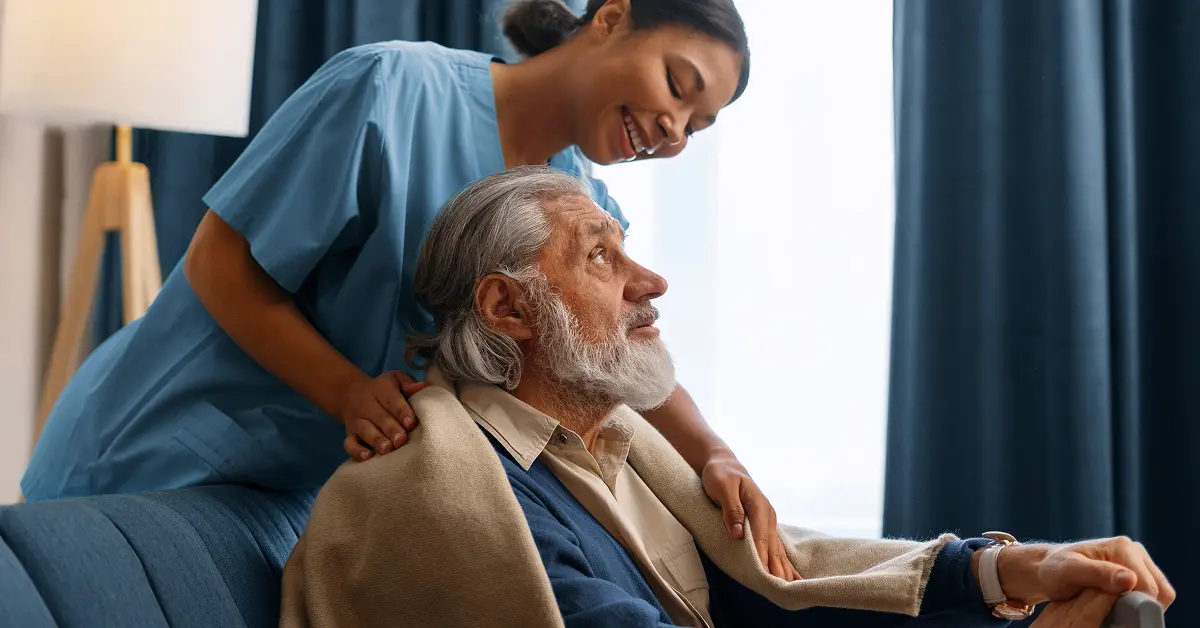Evening time can be one of the most soothing parts of the day—if managed well. For elderly parents, this period often determines the quality of their night’s rest and overall emotional wellbeing. A peaceful evening routine not only helps reduce anxiety and confusion (especially for those with dementia) but also provides a sense of comfort, stability, and love. Whether you are a family caregiver or have hired support, this blog explores practical ways to build a calm, enriching evening routine for your Parent Caregiver at home.
Why Evening Routines Matter for the Elderly
As individuals age, their circadian rhythms change, leading to difficulties in falling asleep or staying asleep through the night. In some cases, elderly people may experience a condition known as sundowning, where confusion and agitation increase as the day progresses. A structured, peaceful evening routine can help alleviate these challenges by:
- Preparing their mind and body for rest
- Encouraging healthy habits
- Reducing anxiety and agitation
- Improving sleep quality
- Enhancing emotional bonding with caregivers or family
A thoughtfully designed routine fosters trust, comfort, and a predictable rhythm that many elders crave.
Start with a Consistent Timeframe
The key to building a peaceful routine is consistency. Set a regular schedule for winding down in the evening. Start by deciding on:
- Dinner time (ideally before 7:00 PM)
- Winding-down activities (like reading or light TV)
- Medication schedule
- Lights-out time
Following the same sequence daily helps elderly individuals know what to expect, reducing mental confusion or irritability.
Serve a Light and Nutritious Dinner
A heavy meal can disrupt sleep, while skipping dinner can cause night-time hunger. Try offering a light, warm, and nutritious meal that supports digestion and sleep. Some tips include:
- Avoiding spicy or fried food
- Limiting caffeine and sugar after 5:00 PM
- Including sleep-promoting foods like bananas, oats, almonds, and warm milk
- Staying hydrated, but limiting water intake post-dinner to reduce bathroom trips at night
Engage in Calming Post-Dinner Activities
After dinner, avoid overstimulating activities like loud television or mobile games. Instead, involve your elderly parent in calming tasks such as:
- Listening to soft devotional or instrumental music
- Reading a book or newspaper
- Watching peaceful nature documentaries
- Gentle conversation about their day
- Playing with a pet
If they enjoy spiritual practices, this could be a great time for prayer, chanting, or meditation, which helps soothe the mind.
Manage Medication Effectively
Most elderly individuals are on regular medication, and many of these need to be taken before bedtime. Keep a log of:
- Medication names and dosages
- Ideal time of intake
- Whether they require food or water
- Any possible side effects
Ensure that medications are given on time and that your parent is alert enough to swallow and digest them. Use a daily pill organiser to avoid confusion.
Incorporate Light Physical Movement
Engaging in light stretching or breathing exercises can enhance circulation and relax muscles. Gentle activities like:
- Seated yoga
- Neck and shoulder rolls
- Deep breathing or pranayama
- Short indoor walks
These can help prevent stiffness and promote restful sleep. Ensure that any physical movement is supervised, especially for parents with balance issues.
Support Personal Hygiene and Comfort
Personal hygiene can have a big impact on sleep comfort and overall health. Encourage your elderly parent to:
- Brush their teeth
- Use the bathroom before bed
- Wash their face or take a warm sponge bath
- Change into clean, soft nightwear
Also, consider grooming tasks like oiling the hair or applying body lotion if they find it comforting. A tidy and clean body can deeply impact the quality of their rest.
Create a Sleep-Friendly Environment
The bedroom should be a haven of peace. Make sure your elderly parent’s sleep space is:
- Quiet and dimly lit (or use a soft night lamp if they feel anxious in the dark)
- At a comfortable temperature with proper ventilation
- Free of clutter to avoid falls
- Equipped with side rails or nightstands for water and tissues
- Set up with comforting items like a soft blanket, favourite pillow, or calming essential oils
Limit Screen Time and Mental Stimulation
Avoid screens at least 45 minutes before bedtime. Blue light from phones or TVs can interfere with melatonin production, making it harder to fall asleep. Instead of scrolling through news or social media, guide your elderly parent towards:
- Audio stories
- Guided meditation
- Simple memory games or puzzles
- Engaging in gratitude journaling or reflection
Build Emotional Connection
Many elderly parents feel lonely, especially if their children are busy or live far away. Evening time is perfect for emotional bonding. Spend 15–30 minutes just talking, holding hands, or reminiscing. Ask them:
- How was your day?
- Is there anything bothering you?
- Do you want to talk about your childhood or family?
This emotional support reduces stress and gives them something to look forward to every evening.
Have a Caregiver's Backup Plan
If your schedule doesn't allow you to manage the routine daily, you can hire a trained caregiver. Ensure they:
- Follow the same schedule you’ve designed
- Are gentle and patient in their approach
- Are trained in medication and hygiene support
- Offer companionship and basic mobility assistance
Many home caregiver services in India offer overnight support for elderly individuals who need help during night-time hours.
Final Thoughts
Creating a peaceful evening routine is not just about making sure your elderly parent goes to bed on time—it's about offering them dignity, love, and calmness in the later years of their life. By managing small, daily steps like consistent timing, nutritious food, emotional bonding, and hygiene care, you can ensure they experience restful evenings that support better sleep and improved health.
Invest in creating a predictable and loving evening environment—because peace at night leads to health in the morning.
Contents
- Why Evening Routines Matter for the Elderly
- Start with a Consistent Timeframe
- Serve a Light and Nutritious Dinner
- Engage in Calming Post-Dinner Activities
- Manage Medication Effectively
- Incorporate Light Physical Movement
- Support Personal Hygiene and Comfort
- Create a Sleep-Friendly Environment
- Limit Screen Time and Mental Stimulation
- Build Emotional Connection
- Have a Caregiver's Backup Plan
- Final Thoughts
Our 24*7 services
Latest Posts
- What Is Respite Care and Why Is It Important
- Affordable home care for senior citizens in India
- Caring for Seniors with Dementia or Alzheimer's at Home
- Senior Caregiving A Guide for Every Family
- How to Write a Caregiver Resume That Gets You Hired
- How Care After Hospital Discharge Speeds Up Recovery at Home
- How to Get Home Health Care for Seniors Through Medicare
- What Does a Senior Citizen Caregiver Really Do at Home
- How to Care for Elderly Parents with Alzheimer’s or Dementia
- How to Get 24-Hour Care for Seniors at Home



